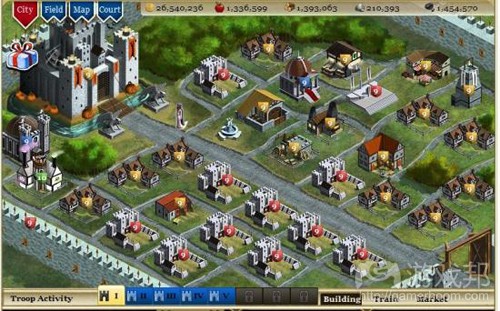Haden Blackman称社交游戏应向服务心态转型
作者:Dant Rambo
如今的游戏产业中存在着各种不确定性因素。有些人认为这种情况很可怕,但是我却始终认为这是一种让人兴奋的环境。对于任何媒介来说惊奇感是一种有益的元素,但是在游戏中,开发者则不得不为此重新评估他们与玩家之间的关系。如此便诞生了服务型游戏这种新内容,这意味着发行后的游戏也不一定是最完整的游戏。如果作为开发者的你并不知道如何在心态上做出改变,不妨听听Kabam总经理的说法。
Blackman日前阐述了开发者在使用新的游戏发行模式时最需要牢记的一些内容。虽然谈话内容主要是关于社交游戏和免费游戏,但是很多建议其实也适用于PC游戏和主机游戏。
首先,Blackman提醒我们在创造一款游戏时不能仅完全专注于游戏玩法。虽然游戏玩法具有巨大的吸引力,但是我们同时也需要重视游戏盈利性。同时他还警告开发者应该避免陷进游戏玩法所造成的“盈利循环”中。换句话说,人们只会愿意为有趣,且没有露骨地“伸手要钱”的游戏掏腰包。
社交/休闲游戏并不存在永久的保质期,但是就像产业中的其它领域一样,你也希望人们能够长时间玩你的游戏。为了帮助开发者实现这一目标,Blackman建议他们使用像PVP等社交元素增加游戏吸引力。当然还有其它有效的内容,但这些却还远远不够。最后他还建议开发者在发行内容时应适可而且,切忌内容超载;应该专注于游戏的核心理念并想办法完善它,使其发光发亮。在游戏发行后,开发者还需要观察游戏参数和玩家反馈,并以此引导着游戏之后的发展。
尽管始终强调为游戏今后的发展预留一定的元素,Blackman也并不主张发布一款残缺或充满漏洞的游戏。事实上在谈及设计哲学时他始终强调稳定性比迅速发布游戏重要得多,我想这也是所有玩家和开发者所认同的观点吧。玩家会因为一款游戏的出色机制而感到惊喜,但是如果游戏的躯壳非常糟糕,开发者的一切努力也将是徒劳。
尽管强调了清除漏洞的重要性,Blackman也认为发行游戏只是整个过程的早期部分。更具体地说是开发者的工作只完成了20%。在此他点出了每周(有时候是每天)更新以及培养忠实玩家基础的重要性。“忠实”在这里有两重意思,一是这类型玩家愿意每天玩你的游戏,更重要的是他们还愿意主动去推广你的游戏。否则你便只能利用一些烦人的推广策略(游戏邦注:如让玩家向好友发送垃圾信息等)。
在某些程度看来社交游戏和硬核游戏是两种完全不相干的游戏类型。但是它们彼此间却仍存在许多可以相互借鉴的元素,Blackman也建议社交游戏开发者从传统游戏领域(如果适用的话)中寻找灵感。很多社交游戏开发者坚信未来的游戏类型将提供给玩家更丰富的游戏体验,但是我却难以认同他的这一观点。我不认为仿效硬核游戏领域能够帮助社交游戏发挥最大的潜力,但相信这么做将能够帮助社交游戏开发者尽力避免犯下相同的错误。
没有人知道今后的社交游戏领域会发生什么,但是如果开发者能够遵循Blackman的部分建议,我们便能够期待更多优秀作品的出现,相信未来休闲游戏与硬核游戏之间的界线将变得越来越模糊。(本文为游戏邦/gamerboom.com编译,拒绝任何不保留版权的转载,如需转载请联系:游戏邦)
Kabam’s Haden Blackman on adopting the games-as-service mentality (Casual Connect)
By Dant Rambo
There’s a lot of uncertainty in the games industry these days. Some have described it as scary, but I myself am firmly ensconced in the exciting camp. Shakeups are healthy for any medium, and in the case of games, it’s causing a lot of creators to reevaluate their relationship with the player. This is resulting in a games-as-service approach to content, meaning a shipped game is not a finished game. If you’re a developer having trouble transitioning into that mindset, Kabam General Manager Haden Blackman wants to help.
In a talk titled “Transitioning from Games-as-Products to Games-as-Services: Ten Common Mistakes to Avoid,” Blackman provided developers in the audience with what he feels are the most important things to keep in mind when embracing the new model of games distribution. Much of the talk dealt with social and free-to-play games, but much of the advice given felt applicable to PC and console developers as well.
First and foremost, Blackman warned against focusing wholly on gameplay when creating a game. It will function as a huge draw, of course, but it’s crucial to keep monetization in mind as well. Taking it further, he advised developers to avoid mistaking “monetization loops” for gameplay. To put it another way, people are only going to pour money into your game if it’s legitimately fun and unobtrusive in its demand for cash. Like many of you, I can say from experience that that’s completely true.
There’s not exactly a set-in-stone shelf life for a social/casual game, but just like in every other facet of the industry, you want people to play your title for as long as possible. To help with that, Blackman recommended baking in social components like PVP. Additional content can help a bit, but it only goes so far. And to that end, it was also suggested that you don’t create more than is needed to launch your game. Focus on the core concepts and make them shine. Then, when it’s out in the wild, look into metrics and player feedback and let it guide the trajectory of your product.
Kabam’s social game Kingdoms of Camelot
Despite the emphasis on saving certain elements for later, Blackman wasn’t endorsing the concept of releasing a broken or buggy game. In fact, he told the audience that stability trumps speed when it comes to design philosophy, which is something I’m sure nearly every player and developer can agree with. A game can feel fantastic on a mechanical level, but it’s all for naught if the shell surrounding it is aggravatingly flawed.
Despite the emphasis on ironing out bugs, Blackman feels that launching a game is the easiest part of the entire process. More specifically, it’s about “20 percent” of the total work. Here he cited the necessity of weekly – sometimes daily – updates, as well as the need to cultivate a dedicated player-base. And dedication was used as a two-pronged concept here. It’s crucial that you have users who play the game on a daily basis, but it’s also important that some of them promote your game organically. Otherwise you have to rely on unsavory tactics like asking players to spam their friends with requests.
Social and hardcore games are, in some ways, apples and oranges. But there’s still plenty they could learn from one another, and Blackman suggested that social developers draw inspiration from what’s happening in the traditional gaming space when it feels applicable. With many social game creators convinced the future of the genre is providing players with more substantial experiences, his point here struck a serious chord with me. I don’t think mimicking what’s happening in the hardcore space will bring social games to their full potential(and I doubt Blackman does either), but keeping an eye on what’s happening there has the potential to prevent the same mistakes being made twice.
There’s no telling what’s next in the social space, but if developers follow even half of the advice Blackman laid out here, I imagine we have a lot of fantastic things in store. Like games that rival their console counterparts in terms of quality, and a further blurring of the line between casual and hardcore.(source:gamezebo)









































